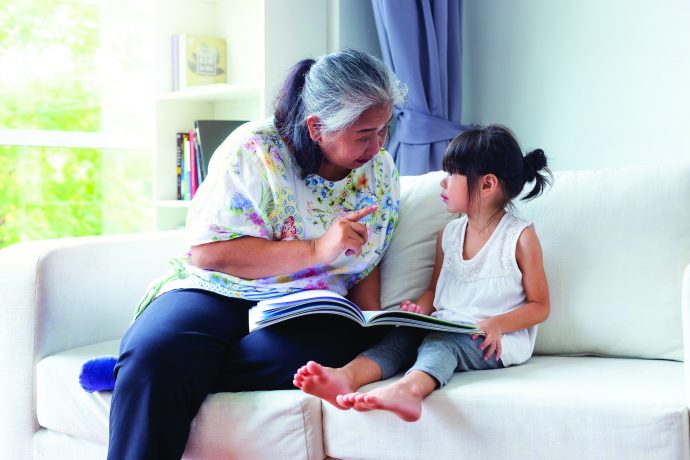It’s common to hear complaints among parents about grandparents overstepping boundaries in terms of raising their children. How can this be managed?
The special role that grandparents play in a family is undeniable. With their experience, they can offer support and advice to parents on various aspects of parenting, especially to first-time parents. They also provide reliable and trustworthy childcare whenever parents need to be away from their children. Grandparents can also be a precious part of children’s lives, pampering them grandchildren, and full stories and wisdom. .
Causes of conflicts
Grandparents may sometimes seemingly interfere when it comes to parenting methods, creating a conflict within the family. Intentionally or otherwise, they may offer unsolicited advice, criticise parents’ methods in managing the kids, or spoil them by bending the rules and routines parents have set. For example, giving kids too many snacks, or being lackadaisical of using child car seat. There are also grandparents who insist on stricter disciplining.
Most parents will overlook an occasional case, but repeated incidents may cause them to feel their authority is being undermined and their capabilities are being questioned. Furthermore, differing instructions from parents and grandparents may confuse the children and to feel trapped between the opposing sides. Without careful consideration, minor disagreements can lead to major clashes and arguments, causing instability within the family.
Striking a balance
Most parents appreciate the presence of grandparents and want them to be involved in their kids’ lives, but at the same time they are wary of their parenting vision being disrupted. To balance this up:
- Define roles. The key to reducing conflict and misunderstanding is for parents to clearly define their own roles and their expectations of the grandparents. Experts agree it is the parents’ role to delegate authority to grandparents, not the other way around.
- Be clear about your rules. No matter how good the intention is, unsolicited advice is rarely welcome. If it’s coming from one’s own parents or particularly from the in-laws, it will most likely be heard as criticism. You and your spouse should first agree with each other on your parenting principles. Then, with a united front, clearly and calmly communicate your rules and expectations to the grandparents. Let them know how they can help you and what they should not do.
- Manage differences with tact. They may disagree with your methods, but try to understand their point of view and gently reason with them. Inform them of how the world has changed and what worked years ago may not work as well now. Stay calm and avoid getting defensive. You can say, “I appreciate your opinion, but I hope you understand that I’m the one who is responsible for my kids.” This is particularly true when it comes to medical or safety issues.
- Be flexible. Everyone wants the best for the kids, so find a middle ground agreeable to both sides. Sometimes it’s okay to let them have their way. Grandparents should be allowed to make decisions when parents are not present, when a child’s action directly affects them, when his safety is at stake, or when he breaks their house rules.
- Make them feel included. Involve them in your discussions about the kids and let them contribute too. For example, they can help to send the kids to and from tuition. Invite them to join you in parenting classes or visits to the paediatrician, so they will be able to understand your decisions better.
Diffusing the tension
Conflicts are bound to happen, not just because of different opinions, but also due to clashing personalities. As this often happens between the spouse and the in-laws, it falls on the son or daughter to mend the relationship. What can be done in case of a heated argument?
- Cool down. The son/daughter should lead both parties away to different rooms to calm down and have space away from the intense atmosphere. This is important as hurtful words may be exchanged and further damage the relationship.
- Become an intermediary. It is better for grandparents to discuss with their own son/ daughter to resolve matters. Alternatively, consult a respectable elderly in the family to mend the relationship.
- Don’t hold grudges. Don’t let the argument or silent treatment drag on. Waiting for the other person to ‘realise their mistake’ or ‘apologise first’ may result in frustration. Sometimes parents may have to lower their ego and seek reconciliation for the sake of the family and grandchildren. The spouse should provide the necessary support to the hurt partner.
- See a family therapist. If all else fails, seek the services of a certified family therapist to help the family reconcile.
Good and open communication is essential in any relationship, including the parent-grandparent relationship. This enables both parties to have mutual respect and understanding, recognise their respective roles in raising the children, and avoid overstepping boundaries.
Family members need to understand that when a couple has their own children, they will have to learn to be parents to their own children. This parenting process is a necessary process in the formation of a family. If grandparents interfere with the parenting process, they are literally taking away the learning opportunity to become parents.








Comments